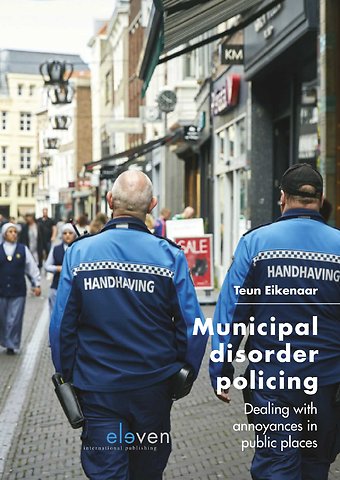Municipal Disorder Policing
Dealing with annoyances in public places (PDF-download)
E-book Pdf met watermerkbeveiliging Engels 2017 1e druk 9789462747593Samenvatting
The policing landscape in the Netherlands has changed considerably over the past three decades; now various new uniformed officers share patrolling duties with the traditional police. This book is about one of the most prominent groups of these recent surveillance professionals: the municipal officers.
It discusses how this profession has changed over time, how municipal officers act in public places, and how these new officers view their work. Through a rich yet compact analysis, the author shows that the emergence of this new occupational group can be understood as being the result of a focused (political) approach to citizens’ annoyances, concerns and fears. The book also demonstrates that the work of these officers is a unique Dutch phenomenon, partly defying theories of disorder policing developed in other countries.
This study will appeal to readers with an interest in plural policing or policies on urban disorder, as well as to those interested in how local governments respond to their citizens’ concerns.
Trefwoorden
Specificaties
Lezersrecensies
Inhoudsopgave
U kunt van deze inhoudsopgave een PDF downloaden
1 Concerns about Disorder 13
2 Backgrounds of new forms of disorder policing 14
3 Developments in Dutch security policies and disorder policing 15
4 Municipal disorder policing: some recent developments 18
5 This study 21
6 Outline 23
2 Strategies of disorder policing 25
1 Zero tolerance and reconquering the streets 25
2 Situational crime prevention 30
3 Improving informal social control and building trust 33
4 Conclusion 36
3 Sociological interpretations of disorder policing 39
1 Benevolent interpretations: disorder policing as a response to
changes in the urban social fabric 39
2 Sceptical interpretations: disorder policing as an exclusionary response 42
3 Comprehensive interpretations: disorder policing as risk management and ‘acting out’ 44
4 Overview 48
4 Methodology 51
1 Approach 51
2 Research design and case selection 53
3 Research methods 56
4 Reliability and validity 60
5 Policy goals of municipal disorder policing: past and present 63
1 Introduction 63
2 Early Dutch concerns about disorder: the 1980s 64
3 Early municipal disorder policing by city wardens: the 1990s 66
4 Intermezzo: new legislation and changes in security policies 73
5 The advent of new municipal disorder policing: 2002 – 2007 77
6 Recent policy goals and tasks: 2007 – 2014 84
7 Conclusions 91
6 Deciding on disorder policing on a local level 93
1 Studying local decision making 93
2 Three ‘logics’ in deciding on municipal disorder policing 95
2.1 Power to the big players: deciding on disorder policing through political logic 96
2.2 Power to the figures: deciding on disorder through managerial logic 99
2.3 Power to the professional: deciding on disorder through frontline logic 106
3 Tensions and conflicts 110
4 Conclusion 114
7 Municipal officers on disorder policing 117
1 Municipal officers on their responsibilities 118
1.1 Addressing annoyances 118
1.2 Expanding responsibilities 121
2 Municipal officers on non-compliant citizens 124
2.1 Decent treatment 124
2.2 Contextual judgment 126
2.3 Consistent enforcement 127
3 Municipal officers and police officers 130
4 Conclusion 133
8 Municipal disorder policing in hotspots 135
1 Policy changes: incidents, politics and angry residents 136
2 Managerial interests 141
3 Daily work: strict role definitions 147
4 Views and experiences of frontline workers 151
5 Conclusions 155
9 Municipal officers, police officers and their work domains 157
1 Introduction 157
2 Argumentations in occupational strife 158
3 Division between municipal officers and police officers: four positions 160
3.1 Strict division: police core tasks and ‘catching crooks’ 161
10 Municipal disorder policing
3.2 Strict division: municipal core tasks and ‘quality of life’ policing 163
3.3 No strict division: towards a new municipal police? 166
3.4 No strict division: the police should do all disorder policing 169
4 Conclusions 171
10 Conclusions 175
1 Findings: an overview 175
2 A new profession dealing with disorder 179
2.1 A new profession and its quest for organised autonomy 179
2.2 Citizens’ concerns at a central position? 181
2.3 Pragmatic management of disorderly behaviour 182
2.4 Hotspot policing 183
3 Interpreting municipal disorder policing 184
3.1 Bolstering informal social control? 185
3.2 Reclaiming public spaces as exclusivist practice? 186
3.3 Symbolic politics: acting decisively and regaining authority? 187
3.4 Managing risks and controlling deviancy? 189
4 Discussion 190
4.1 The complacency of a pragmatic profession 191
4.2 Interpreting disorder 192
4.3 Some consequences 194
Samenvatting 197
Bibliography 205
Appendix – Six city surveillance agencies 215
Anderen die dit e-book kochten, kochten ook
Rubrieken
- advisering
- algemeen management
- coaching en trainen
- communicatie en media
- economie
- financieel management
- inkoop en logistiek
- internet en social media
- it-management / ict
- juridisch
- leiderschap
- marketing
- mens en maatschappij
- non-profit
- ondernemen
- organisatiekunde
- personal finance
- personeelsmanagement
- persoonlijke effectiviteit
- projectmanagement
- psychologie
- reclame en verkoop
- strategisch management
- verandermanagement
- werk en loopbaan








